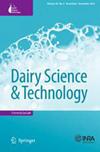瘤胃后灌注酪蛋白对奶牛产奶量、乳成分和氮利用效率的影响
Q2 Agricultural and Biological Sciences
引用次数: 1
摘要
充足的氨基酸供应可以提高氮素的利用效率。酪蛋白是主要的乳蛋白,添加酪蛋白可以提高乳蛋白的合成和氮效率。我们评估了瘤胃后添加酪蛋白对产奶量、乳成分和全体蛋白质沉积的影响。试验选用2头瘤胃插管的荷斯坦奶牛(599 kg),分别饲喂0或400 g/d酪蛋白。饲粮由玉米青贮料、苜蓿干草、湿玉米面筋饲料、全棉籽和谷物混合物组成,并通过皱胃灌注320 g/d葡萄糖以增加能量代谢蛋白。试验分为3个8 d期。收集牛奶、尿液和粪便样本,评估产奶量、牛奶成分和氮潴留。瘤胃酪蛋白输注提高了乳蛋白率和乳尿素氮(p < 0.01)。输注酪蛋白使小鼠氮潴留(p = 0.03)和尿氮排泄量(p < 0.001)增加,粪氮排泄量(p < 0.001)减少。结果表明,酪蛋白刺激了泌乳奶牛的蛋白质沉积,改变了奶牛对氮的利用。4天的适应期是评价对酪蛋白补充反应的适宜期。我们的数据提供了有助于设计未来实验的元素。本文章由计算机程序翻译,如有差异,请以英文原文为准。
Effect of Post-Ruminal Casein Infusion on Milk Yield, Milk Composition, and Efficiency of Nitrogen Use in Dairy Cows
Adequate supply of amino acids can improve the efficiency of nitrogen use. Casein is the predominant milk protein, and its supplementation can improve milk protein synthesis and nitrogen efficiency. We evaluated the effects of post-ruminal supplementation of casein on milk yield and composition and whole-body protein deposition. Two ruminally cannulated Holstein dairy cows (599 kg) were used in a switch-back design, and treatments were an abomasal infusion of 0 or 400 g/day casein. Cows were fed a diet consisting of corn silage, alfalfa hay, wet corn gluten feed, whole cottonseed, and grain mix, and they received 320 g/day dextrose via abomasal infusion to increase energy:metabolizable protein. The experiment used three 8-day periods. Milk, urine, and feces samples were collected to evaluate milk production, milk composition, and nitrogen retention. Abomasal casein infusion increased (p < 0.01) milk protein percentage and milk urea nitrogen. Nitrogen retention (p = 0.03) and urinary N excretion (p < 0.001) were increased and fecal N excretion (p < 0.001) was decreased by casein infusion. Results suggest casein stimulated protein deposition and altered nitrogen use in lactating dairy cattle. Adaptation periods of 4 days were appropriate for evaluating responses to casein supplementation. Our data provide elements that can aid the design of future experiments.
求助全文
通过发布文献求助,成功后即可免费获取论文全文。
去求助
来源期刊

Dairy Science & Technology
农林科学-食品科技
CiteScore
2.30
自引率
0.00%
发文量
0
审稿时长
2 months
期刊介绍:
Information not localized
 求助内容:
求助内容: 应助结果提醒方式:
应助结果提醒方式:


